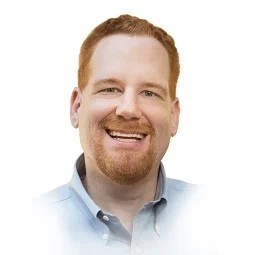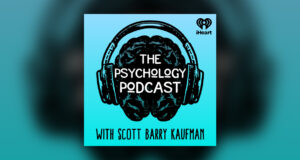
Rachael Beairsto is a senior editor with Healthline Media. She covers many health topics, including mental health, chronic conditions, and skin care. Most recently, she supported the launch of Wellos, a mobile wellness app that helps members reach their stress, nutrition, and weight goals. She’s passionate about sharing accurate, engaging health information to help people lead their healthiest, happiest lives.

Our host, Gabe Howard, is an award-winning writer and speaker who lives with bipolar disorder. He is the author of the popular book, “Mental Illness is an Asshole and other Observations,” available from Amazon; signed copies are also available directly from the author.
Gabe makes his home in the suburbs of Columbus, Ohio. He lives with his supportive wife, Kendall, and a Miniature Schnauzer dog that he never wanted, but now can’t imagine life without.
To book Gabe for your next event or learn more about him, please visit gabehoward.com.
Producer’s Note: Please be mindful that this transcript has been computer generated and therefore may contain inaccuracies and grammar errors. Thank you.
Announcer: You’re listening to Inside Mental Health: A Psych Central Podcast where experts share experiences and the latest thinking on mental health and psychology. Here’s your host, Gabe Howard.
Gabe Howard: Hey, everybody, welcome to the show. I’m your host, Gabe Howard. I want to welcome back senior editor for Healthline Media, Rachael Beairsto. As a health editor, she manages the creation of content that publishes on Healthline.com. She has a background in biology and helps us cover a huge range of health conditions, from general wellness to niche chronic conditions. Rachael, welcome back to the show.
Rachael Beairsto: Thanks, Gabe. Thanks for the warm welcome. It’s good to be back. Good to see you.
Gabe Howard: I am so glad that you’re back because back in July, you came on the show to discuss out of bounds questions that listeners were asking about mental health on our website. Now, listeners loved that show, so we get to do it again. Rachael, what question are we tackling this time?
Rachael Beairsto: So we had a lot of great questions to choose from this round, but one that we felt was a good one for us to cover this episode: why won’t any mental health professional diagnose a US presidential candidate as mentally ill? What is the American Medical Association waiting for? Can’t doctors tell us when they know a presidential candidate is crazy? So there’s a lot to unpack there. But that’s sort of why we felt like we should talk about it today. Any initial thoughts on that, Gabe?
Gabe Howard: My first initial thought is that all of our listeners who lean Democrat are going to be like, why didn’t they say this about the Republican nominee? And all of our listeners who lean Republican are like Why didn’t they say this about the Democratic nominee? And I think really that’s the answer to the question. The reason that they can’t do it is because there is a subjectiveness in this. There really is a lot to unpack. There’s many, many, many reasons that psychiatrists and mental health professionals are not going to publicly comment on the mental health of a political candidate. There’s two that we want to cover, though. One is boring. You can’t diagnose somebody based on their public persona, right? You can’t treat a patient that you’re not actually treating. So it would be wholly irresponsible to say, oh, I saw somebody in public. I did not work with them directly. I just observed them from a distance. Ask them no questions. Did no cognitive testing? Nothing. I just simply watched them on TV. And now I’ve decided that they have a mental illness. That’s just not how any of this works. But interestingly enough, all the way back in 1964, psychiatrists and mental health professionals did do this. They did this to a candidate who is running for president named Barry Goldwater,
Gabe Howard: Where they decided that he had a mental illness and they publicly spoke on it, and it tanked his political career, and it was completely untrue. This never happened. The man had no mental illness to speak of, at least none that ever came out publicly. So in 1973, the American Psychiatric Association decided to put in formal rules that just said, hey, you’re not allowed to do this. You’re not allowed to comment on it. It creates way too many problems. It’s unprofessional, it’s unethical. And ever since then, the Goldwater rule has been in place. And
Gabe Howard: So the easiest answer to the question, Rachael, is because they’re not allowed. They’re not allowed to do it.
Rachael Beairsto: Mm-hmm. Yeah. What happened was when Barry Goldwater was running for president in the 1964 presidential election, there was a magazine called Fact Magazine that created an informal survey, and they conducted it only a week after he received the nomination for the Republican Party for president. And basically they said that they distributed a questionnaire to over 12,000 psychiatrists in the US and around 2,400 people responded, and the majority of them deemed him unfit for office. So 1,189 deemed him unfit for office. 657 stated that they believed him to be mentally fit and well enough for office, and then 571 said that they did not know enough about him to answer the question objectively, which I think is really interesting, that the, I guess the majority, if they did actually send it out to 12,000 psychiatrists, didn’t respond. But of those who did respond, the fewest number said that they didn’t know enough.
Rachael Beairsto: So I think that that is really interesting because obviously at the time, without that rule put in place by their professional organization, people did feel empowered to weigh in on the mental state of a presidential candidate. And this is back in 1964, when, if you think about it now, we have way more access, you could say, or at least exposure to political candidates, you know, their inner thoughts, people tweeting 24/7. We just I think we know more about candidates than we did in 1964. So I think it’s an interesting contrast.
Gabe Howard: It’s interesting that you pointed out how little access they had in 1964 because, for example, for the vast majority of people, anything that they saw from a political candidate in 1964 was filtered at least once because it had to be on the television news, it had to be written by a reporter. You didn’t literally have access directly to the candidate without there being a middleman, and yet people still felt that they could weigh in. They felt like they had enough information to weigh in. Now, this has created a little bit of a controversy because now they’re saying, hey, look, maybe the Goldwater rule should expire. Maybe it’s ran its course because now we can see firsthand from presidential candidates because we have things like social media. We have things like the internet where, yeah, maybe they’ll play a 30 second clip on the news, but they’ll let you see the speech in its entirety on their website. So now somebody doesn’t just have to worry about the sound bites. Somebody could literally examine the whole speech from the second the candidate walks on stage to the second, the candidate walks off and can go look at their own social media and see the things that they are tweeting and the things that they are putting on Facebook, TikTok, Instagram, their own videos, etc. So now mental health professionals are starting to say, hey, look, we’re not relying on third party information anymore. We’re staring right at the candidate who is acting erratically, who is behaving in ways that we think are unfit, and the public has a right to know our findings.
Rachael Beairsto: I think that probably the biggest reason that this rule was put into place is because, you know, I don’t think that Barry Goldwater was ever known to be diagnosed with any mental health condition. Right. So I think his public persona was grandiose and he had really strong opinions on things, which is why people had a very strong reaction to his candidacy. But that said, it doesn’t mean that his public persona was who he was as an individual and as a person.
Gabe Howard: Now, one could make the argument that he chose that public persona.
Rachael Beairsto: Absolutely.
Gabe Howard: But people choose public personas for all kinds of reasons.
Rachael Beairsto: Exactly. Yeah.
Gabe Howard: I mean, look at like, Larry the Cable Guy. Right? I don’t think he dresses that way in real life. If we go back further. George Burns. Right? George Burns always performed holding a cigar, but he actually stopped smoking decades before. It was just an iconic part of his acts. We have comedians who pretend to be drunk and drink apple cider, but pretend that it’s vodka or whiskey. So your public persona is just just that
Gabe Howard: It’s created to advance your public career. Nothing crazy about that.
Rachael Beairsto: I think that the Goldwater rule itself helps to block that stigma or the perpetuation of stigma, at least for people living with mental health challenges. I mean, you know, this living with bipolar disorder, sometimes conditions take years to get right and to get the right diagnosis for it. Like, that sort of off handed opinion can mean real stigma is then spread throughout anyone who’s listening to that opinion. So I get why that would be a concern.
Gabe Howard: I think it’s a really good point that you bring up, Rachael, that they only want you to say negative things. Nobody ever asks a psychiatrist to come on and defend it like, hey, can people with bipolar disorder, major depression, anxiety, schizophrenia, psychosis, whatever, any mental health issue? Is that person, a quality person who is capable of doing things? And then the psychiatrist gives all the reasons that people who have suffered from a mental health crisis, or who live with a diagnosable mental illness, contribute to society in extraordinarily meaningful ways. It’s always a pejorative, it’s always a negative. Come on, tell me that that person’s crazy so that people won’t vote for them, support them or like them. So yeah, it really does create the idea that having the mental illness makes you bad. It’s never delivered compassionately or kindly. It’s not. Oh, that’s too bad. Barry Goldwater would have been an excellent president if it wasn’t for this illness that he had. It’s so sad. No, it’s oh, he’s unfit to be president. He’s crazy. He’s nuts. There was zero compassion for the man, even though these were medical professionals who were weighing in on whether or not he was sick. And yet all they cared about was tanking his career. And it’s it’s utterly fascinating to me. And another reason that I think the rule really needs to be in place, it’s it’s really designed to prevent harm.
Rachael Beairsto: I think this is a good place to bring in our second question, which someone did write in directly about the Goldwater rule. They asked, can you cover the Goldwater rule? Perhaps it needs to be repealed, and I will start with the fact that it’s not actually a legal rule that exists. Right? It’s not illegal for people who, psychiatrists specifically to comment on someone publicly. The American Psychiatric Association has deemed that it’s unethical and that there might be consequences. So they might be kicked out of that professional organization. But it also only applies to psychiatrists who are members of the APA. In general, the field, I think, accepts the rule. There is some criticism of it. I think it would be interesting for us to talk about some of those gray areas and critiques of it as well.
Gabe Howard: It’s really interesting how that’s been framed, Rachael, because if you go all the way back to the first debate, the one against President Biden and President Trump, a lot of medical professionals weighed in on the cognitive abilities of Joe Biden, and people weighed in on what can we expect in the aging process of Joe Biden, because he would have been the oldest president to to be reelected had he decided to stay in the race? And we saw all of this commentary play out well within the public domain. And ultimately, President Biden decided to drop out of the race. Then we step into the new race, and suddenly all that commentary dried up. There was no commentary about President Trump’s cognitive abilities. Nobody weighed in on his erratic behavior, his late night social media posts or anything like that. And people started asking questions, hey, listen to this. This speech. Is that coherent? Does somebody who sounds like this, are they okay? And then professionals said, we can’t weigh in because of the Goldwater rule and I think the public was like, well, wait a minute. We literally chased another man off the ballot because of medical opinion and society being concerned that he was not fit to be president physically. And now we’re asking the same questions about this next guy, and suddenly you can’t say a word. And I think that’s why people are writing in. I think that’s why people are so fascinated, like, wait a minute, why are we not having medical and professional commentary about President Trump in the same way that we had medical and professional commentary about Joe Biden? And I think that’s a very relevant question.
Rachael Beairsto: There’s this quote that I pulled from an article in The Lancet, which was published in March 2024, when Joe Biden was still the presidential nominee for the Democratic Party. So I’ll read it quickly: Akin to fake news in past elections, deepfakes of Mr. Biden exhibiting signs of cognitive decline have already captured news headlines. These could shape post-truth messaging and voter sentiment. Thus, in the 2024 cycle, psychiatrists will need to balance ethical obligations alongside public demands for scientific insights, likely renewing tensions over the APA’s Goldwater rule, which I think is really interesting because obviously there is that thirst for expert commentary. And I think even as an everyday citizen myself, I would want commentary from people who are the most qualified to be weighing in on these things. But I also see the point in having the Goldwater rule in place to ensure that there are certain protections for people in the public eye. I think, have you heard of post-truth before?
Gabe Howard: You know, I’ve heard rumblings about this, but. But can you explain it? Because we also want to make sure our listeners know.
Gabe Howard: It’s not that I don’t know, Rachael. It’s that I want to make sure that they know.
Rachael Beairsto: Okay. You’re so generous. Always. So I actually did look up a definition so I could share it with you and not you, but mostly the audience. But basically, post-truth refers to a situation whereby facts have lost their currency in contemporary political and public debate. So that’s sort of what we’re talking about with the Goldwater rule, right? So the concept of post-truth is not so much used to suggest that truth does not exist, but that facts have become secondary to our political point of view. So, it’s haunting to me in a way that this concept is becoming more and more relevant. But I think that that’s why people are resurfacing these critiques of the Goldwater Rule and looking for the truth where it exists. Because more and more it seems like alternative facts and things that aren’t true. More so, emotions are leading people into their like in their political lives and opinions. And I think that the question that we got is probably from someone who is seeking more of a truthful approach.
Gabe Howard: It’s really fascinating to me because on one hand, I agree with this. You’re saying, hey, look, I want to seek out an expert opinion. If I could get people on the internet to do this, I would be so happy. So when I hear you talk, Rachael, I’m like, well, yeah, they just want a professional opinion. But I really do think that we need to keep the Goldwater rule in place, because when it comes to politics, doctors have biases, too. Remember, no mental illness has a definitive test. There’s no blood test, there’s no hair test, there’s no nothing for this. So it’s always going to be opinion. And those opinions are always going to be made by humans who may have an agenda or even, at the very least, an unintentional bias.
Rachael Beairsto: Yeah. And I think with the Goldwater rule, the APA is asking its members to consider their roles as private citizens versus professionals and like professionals making commentary, especially as separate things that they are saying that as a private citizen, you can believe and act however you want, but as a professional you have a duty. And these are the standards that we are holding you to.
Gabe Howard: I want to dive right into the controversy and say that, you know, we had a presidential candidate whose behavior was extraordinarily erratic. The things that they lied about just kept coming up over and over and over again and were so easily disproved. And, you know, unfortunately, I’m not trying to get political. But, you know, President Trump maintained for four years that the election was stolen despite so much evidence to the contrary. And people were asking psychiatrists and psychologists and mental health professionals very specific questions. Is that a delusion? Is somebody who repeats the same lie for four years straight in their quest for power? Is that person mentally unstable? These are very specific questions that the entire country was asking, and we never got answers to those questions.
Rachael Beairsto: Well, I will also counter that with is it delusion or is it a political strategy? Is that morally right? I don’t know, but it also could be a political strategy.
Gabe Howard: You’re absolutely right, Rachael. I think it’s important to point out that there is no law that says that you can’t lie. Lying is perfectly legal, and let’s move it away from politics for a moment. There is nothing that says that you can’t lie in your personal life. There’s nothing that says that you can’t cheat on a spouse or in a relationship and then lie about it. There are no laws that prevent this. Let’s look at websites out there, like flat earth websites, right? The world is round. That’s a scientific fact. We’ve known this for generations, but we cannot shut these websites down. We cannot stop them from teaching that the earth is flat. We cannot stop a person from charging money to teach the earth is flat. This is all perfectly legal, and politicians are essentially allowed to follow the same rules as all the flat earthers.
Rachael Beairsto: Yes they are, and it can be a little scary at times. I think for our subject around the Goldwater rule, especially though as it pertains to the study of mental health and moving that field forward, I do think that the Goldwater rule, in some respect, existing makes sense. But I understand where the critique is coming from because as we’ve said, you know, like people can lie. There’s not a perfect system for politics or for the public eye. And I think there is a thirst for people with training to be weighing in on these things. But as we discussed before, there’s also a lot of potential harm that can be done with doing that in a way that is biased, in a way that is not done thoughtfully or with any care. So it’s a big gray area. Isn’t there?
Gabe Howard: It is a lot, and I can certainly understand, especially in this past election cycle, that we saw why people wanted more professional opinions and why they wanted to weigh in on it. And as we’re nearing the end of the show, I do want to leave people with this thought. We have a Supreme Court right now that hasn’t had a unanimous verdict on any controversial issue, really, in our lifetime. It always goes conservative judges, liberal judges, conservative judges, liberal judges, and I always think to myself, but they’re all judges applying the identical laws. They’re all reading from the same source material and coming up with something different. And unfortunately, mental health is like that as well. So I really do believe that even if you removed the Goldwater rule, you would just either get an echo chamber, meaning if you watch conservative news, you would get a whole bunch of conservative psychiatrists and psychologists and mental health professionals who would say that the other person was crazy. And if you watched more liberal news, the the reverse would be true. So if you were actually looking for unbiased information, I don’t know that you could find it. I think that both sides could find plenty of experts to prove that their opponent was unfit, and in that way, we wouldn’t have more clear information.
Gabe Howard: We would just have more information that contradicted each other, and it would devolve quickly. And I think the biggest fallout of this would be all of the Americans who were living with mental illness or who have suffered a mental health issue, would be hearing about their conditions mixed in with politics, and they would wonder how much of what they’re hearing applies to them. And I think the general public would start to wonder how much of what they’re hearing applies to the people who live in their communities. I think by and large, politicians are going to be fine. Even if they lose the election. They’re largely protected and wealthy, and they have other career aspirations and opportunities. But I think the average person living with a mental health condition or a mental illness, when they hear these things, I think it hurts them the most. And perhaps if that’s the only reason to keep the Goldwater rule in place, I think it’s a very compelling one.
Rachael Beairsto: I agree, mic drop, Gabe.
Gabe Howard: Mic drop, Gabe. Rachael, thank you so much for being here.
Rachael Beairsto: Thank you for having me back. It was a pleasure.
Gabe Howard: Did you have fun?
Rachael Beairsto: I did, I always do.
Gabe Howard: I like it when you have fun. All right. Well, thank you so much for being here. And a great big thank you to all of our listeners as well. My name is Gabe Howard, and I’m an award winning public speaker who could be available for your next event. I also wrote the book “Mental Illness Is an Asshole and Other Observations,” which you can get on Amazon but don’t get it there. Come to my website and get a signed copy and I’ll give you some free show swag. That website is gabehoward.com. Wherever you downloaded this episode, please follow or subscribe to the show. It is absolutely free and you don’t want to miss a thing. And hey, do us a favor, recommend the show. Tell everybody you know. Sharing the show is how we’re going to grow. We will see everybody next time on Inside Mental Health.
Announcer: You’ve been listening to Inside Mental Health: A Psych Central Podcast from Healthline Media. Have a topic or guest suggestion? E-mail us at [email protected]. Previous episodes can be found at psychcentral.com/show or on your favorite podcast player. Thank you for listening.




